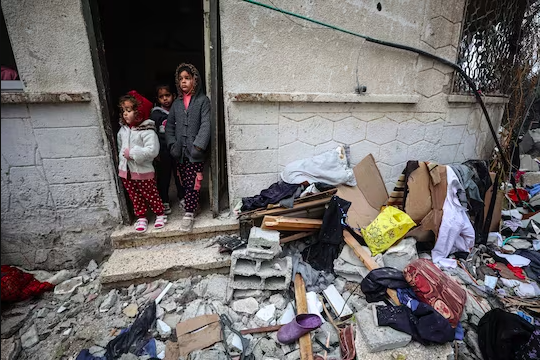
Published 02/09/2024 15:53
United States President Joe Biden delivered one of the harshest rebukes to date of Israel’s military conduct in Gaza, calling the operation to pursue Hamas “exaggerated.” At a White House press conference on Thursday (9), Biden also expressed optimism about a deal being negotiated, which could result in the release of hostages and an extended pause in fighting, potentially leading to a more sustained shift in politics. war.
Biden painted a vivid picture of the suffering in Gaza, highlighting the need for additional measures to contain the humanitarian crisis in the region. His remarks offered a new perspective on his view of the four-month conflict, which has tested American diplomacy and revealed divisions within his Democratic coalition.
“I am of the opinion, as you know, that the conduct of the response in Gaza was exaggerated,” Biden told reporters. He mentioned his efforts to open Gaza to allow in more humanitarian aid as part of his efforts to alleviate the suffering of the local population.
Biden’s assessment of the Israeli military campaign as excessive marks a significant shift in his public stance on the conflict. Although he has been a staunch supporter of Israel for much of the past few months, Biden has expressed growing frustration with Israeli Prime Minister Benjamin Netanyahu for not following U.S. calls for a reduction in the intensity of fighting.
During the interview, Biden emphasized the plight of Gazans, who have suffered heavy Israeli bombardment and face shortages of essential supplies since the October terrorist attacks. “Many innocent people are dying of hunger. Many innocent people are in trouble and dying. And this needs to stop”, highlighted the president.
Biden faced increasing pressure from members of his own party to speak out more forcefully about the situation in Gaza and demand a ceasefire. He has been the target of protests in various parts of the country where he has traveled in recent weeks.
As American, Qatari and Egyptian negotiators continue to work on a deal between Israel and Hamas to halt the fighting in exchange for the release of prisoners, Biden expressed his commitment to resolving the situation. “I’m pushing hard right now to deal with this hostage ceasefire,” he said. “I’ve been working tirelessly on this.”
But in making an accurate assessment of the latest developments in the Middle East, Biden made the kind of mistake his team hoped he would avoid, given questions about his age and memory, by confusing the presidents of Egypt and Mexico.
“I think, as you know, initially the president of Mexico, Sisi, didn’t want to open the door to allow humanitarian supplies in,” he said, referring to Abdel Fattah el-Sisi, president of Egypt, not Mexico. “I talked to him. I convinced him to open the gate. I spoke to Bibi to open the gate on the Israeli side.”
Meanwhile in Rafah
Israeli Prime Minister Benjamin Netanyahu ordered a “massive operation” in the southern Gaza city of Rafah, one of the last refuges for civilians in the besieged enclave, his office announced on Friday. This action has raised significant concerns, especially among United States officials and humanitarian organizations, about the potential loss of civilian life.
Netanyahu instructed the Israel Defense Forces to present a “twin plan” to the cabinet, aimed at evacuating the civilian population from combat zones and “collapsing” the four remaining Hamas battalions believed to remain in Rafah, according to an official statement from his office. . However, the specific details of this plan have not yet been released, leaving uncertainty about its implementation and impact.
Israeli airstrikes on Rafah overnight on Thursday resulted in at least five deaths, according to local health officials, raising fears among the region’s displaced residents. With the city’s population estimated at 1.4 million, more than five times the pre-war count, the humanitarian situation is critical, with thousands of people living in precarious conditions amid ongoing violence.
Recent statements by Netanyahu and other Israeli officials about continuing the military campaign in Rafah have raised alarm among humanitarian groups and generated international concerns. US National Security Council spokesman John Kirby expressed that a major military operation in Rafah would be disastrous and emphasized that the US would not support such an action.
Aid organizations have warned of a worsening humanitarian crisis if Israel moves into Rafah, highlighting that disease and hunger are already widespread among the displaced.
In light of these developments, the International Rescue Committee warned that an attack on Rafah would result in even greater destruction throughout Gaza, exacerbating the already precarious situation of the region’s inhabitants. Philippe Lazzarini, head of the United Nations Relief and Works Agency for Palestinian Refugees (UNRWA), expressed concern about the intensification and growing complexity of the crisis, questioning how long his agency can operate in such a risky environment.
Source: vermelho.org.br

